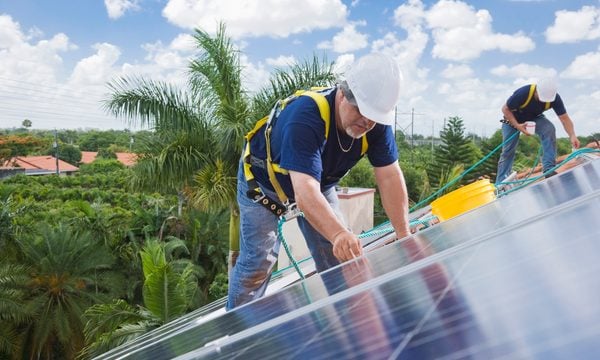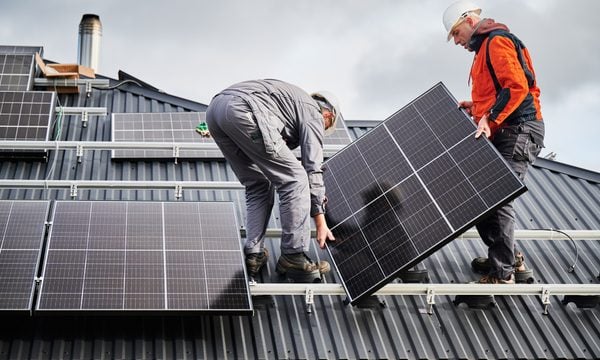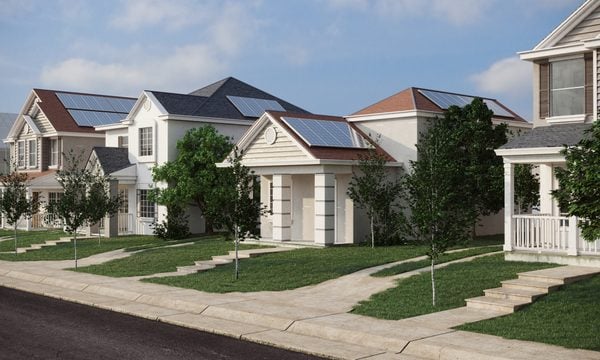How to Clean Solar Panels: DIY or Hire Pros?
Solar panel cleaning can maximize energy production, but how often you clean will depend on environmental factors.
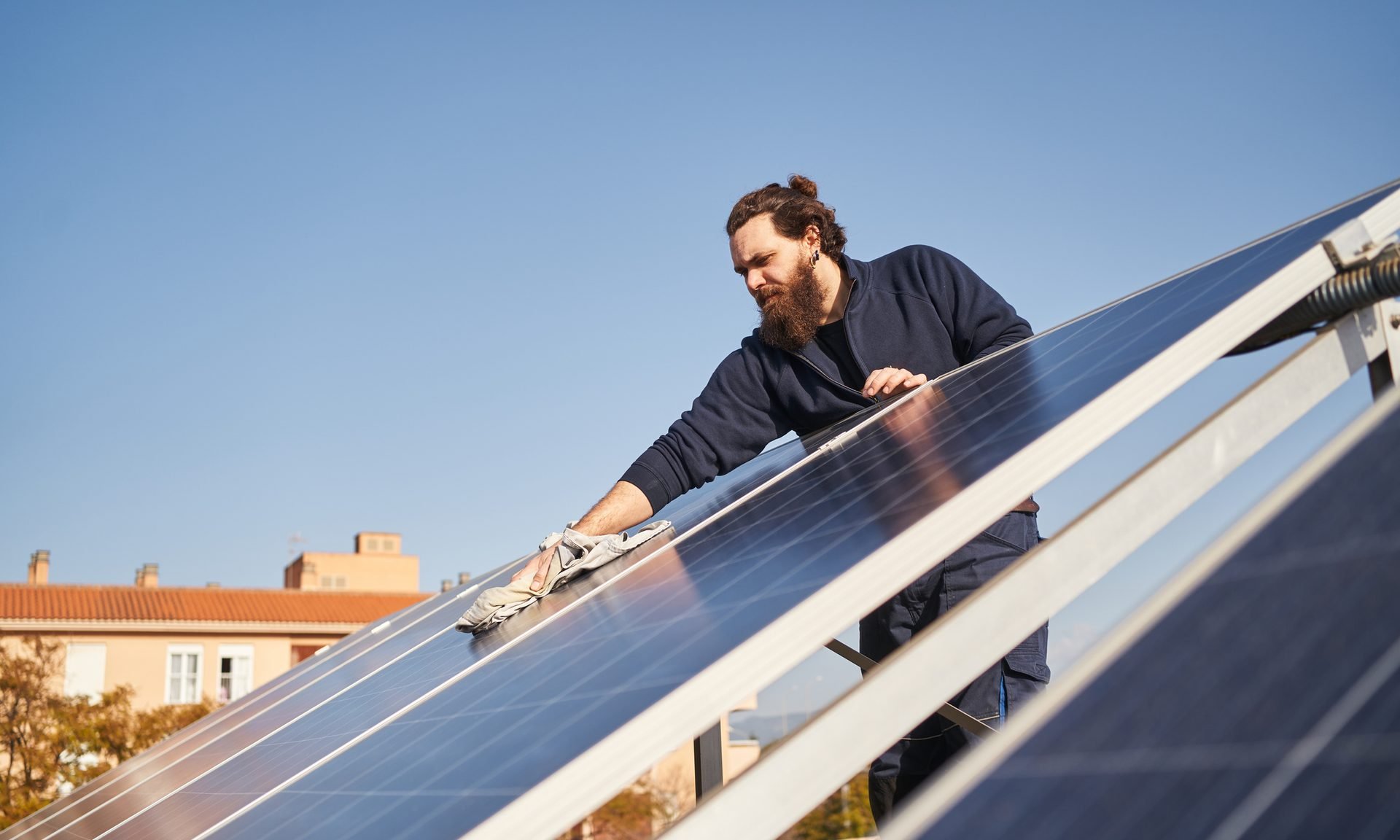
Some or all of the mortgage lenders featured on our site are advertising partners of NerdWallet, but this does not influence our evaluations, lender star ratings or the order in which lenders are listed on the page. Our opinions are our own. Here is a list of our partners.
Occasional solar panel cleaning will ensure they generate as much energy as possible. Depending on where you live, you should clean your panels once or twice a year. You can clean them yourself with a hose and mild soap, or you can hire professionals for about $100–$350.
Is it worth cleaning your solar panels?
For most people, it’s worth cleaning your solar panels now and then.
To get the maximum amount of sunlight, your solar panels need to be free of dust, pollen, dirt, debris, bird droppings and soot. Although pollutants and particles that build up on your panels won’t stop them from producing power, they can make your panels less efficient. That translates to an annual energy loss of up to 7% in drier, dustier parts of the U.S .
» MORE: How do solar shingles work?
If you live in an area that gets a lot of rain, cleaning your panels is not as critical. However, if your area is dusty, the morning dew settling on them can combine with the dust to form a cement-like substance called cementation that sticks to the panels and is hard to remove. Cementation can be caused by the fine particles of urban pollution and by regular dust.
» MORE: How much do solar panels cost?
What is the best way to clean solar panels?
You can hire a professional to clean your panels, and it’s also simple to clean your panels yourself. If you do it yourself, be sure to follow these steps to avoid damaging your panels or voiding your warranty.
- Clean at the right time. Solar panels on your roof can get very hot. Clean them at a cooler time of the day, so you don’t cause cracks by running cool water on hot panels. This will also prevent the soap from drying on the panels before you can rinse it off. Don’t wait till evening either, because dirt and dust could stick to your panels overnight if they don’t have enough time to dry off. The optimal time to clean your panels is early in the morning.
- Check your warranty. Solar panel warranties may come with specific maintenance guidelines. Your solar panel manufacturer or installer should have provided warranty guidelines for cleaning.
- Turn off your solar system. To protect both yourself and your system, it’s a good idea to turn it off before you start cleaning.
- Gather the proper tools. Solar panels should be washed with a mild soap, such as dish soap. A vinegar-and-water mixture is also a good alternative. Never use abrasive cleaning chemicals, glass cleaner or bleach. You can use a soft brush to sweep off dirt and a soft sponge or cloth to wipe the panels down, but never use rakes or hard brushes. If possible, use lukewarm water from a garden hose to clean your panels; very cold or hot water can damage your panels. Never use a pressure washer on your panels.
- Wash the panels. Using a garden hose, spray the panels to rinse off loose dirt and debris. Then apply the soap and wipe the panels with a soft sponge or brush.
- Rinse thoroughly. When you’re done cleaning, rinse the panels thoroughly with clean water to remove any lingering soap residue, dust or dirt. You can also go over the panels with a squeegee to help them dry more quickly.
🤓 Nerdy Tip
To keep the soap from drying on the panels, clean your system one section at a time. How often do solar panels need to be cleaned?
In most parts of the U.S., cleaning your solar panels once or twice a year is enough.
You may need to clean your panels more often if you live near sources of pollution, such as freeways, airports or industrial areas, or in a dusty, arid region such as the Southwest. If your panels are near vegetation that could drop pollen or leaves on them, you should also consider cleaning them more often.
If your region gets a lot of rain, you won’t need to clean your panels as often. Most panels are installed at an angle, which helps the rain wash off dust and dirt. But if your panels are installed flat, you’ll probably have to clean them more often.
If you’re not sure how often you should clean your panels, you can use your home monitoring system to see if your energy production is going down. That will give you a good idea of whether it’s time to clean your panels. Drops in efficiency of about 0.5% annually are normal. Any drops higher than this could be a sign that your panels need cleaning.
How much does it cost to have my solar panels cleaned?
Hiring a professional to clean your panels typically runs about $100–$350, or $15–$25 per panel. These factors affect the cost:
- Location. Like everything else, costs to clean your panels will vary depending on where you live. Costs will also vary depending on how easy your panels are to access.
- System size. Although cleaning will cost more for a larger system, most solar panel cleaners charge a minimum fee.
- How dirty your panels are. It takes more work to clean panels that have had dust and dirt building up on them for some time, so that could cost more.
If you leased your system, it may come with a maintenance agreement that covers cleaning.
» MORE: How long do solar panels last?
Safety considerations
For maximum safety, be sure to turn off your system before cleaning your panels.
There are always risks involved in getting on a roof, and when you add the slick surface created by washing, that increases the risk. If you can reach your panels from the ground with a soft cloth or sponge on a long pole, that’s ideal for staying safe while cleaning.
If you do need to get on the roof, wear rubber-soled shoes with a good grip. Use a sturdy ladder and a safety harness if you have one, and get someone to spot you. Be gentle with your panels, and avoid walking or kneeling on them.
Article sources
NerdWallet writers are subject matter authorities who use primary,
trustworthy sources to inform their work, including peer-reviewed
studies, government websites, academic research and interviews with
industry experts. All content is fact-checked for accuracy, timeliness
and relevance. You can learn more about NerdWallet's high
standards for journalism by reading our
editorial guidelines.
- 1. National Renewable Energy Lab. Scientists Studying Solar Try Solving a Dusty Problem. Accessed Sep 5, 2024.
More like this
Related articles
AD
Save On Solar Without the Middleman
Free Instant Quote
on Project Solar's website

AD

Save On Solar Without the Middleman
- $750 OFF install with NerdWallet;
- SolarCare™: top-tier warranty & 25-year production guarantee;
- No sales commissions mean premium equipment & tech at up to half the price.
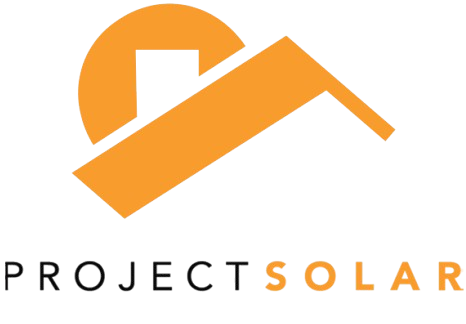
Free Instant Quote
on Project Solar's website




